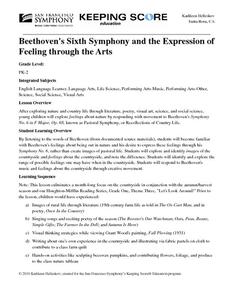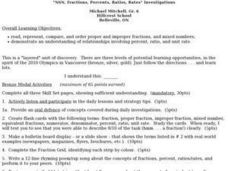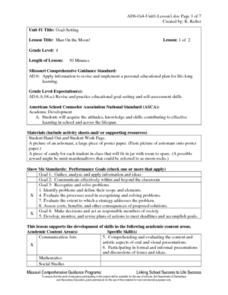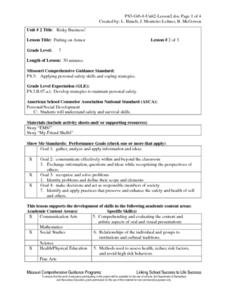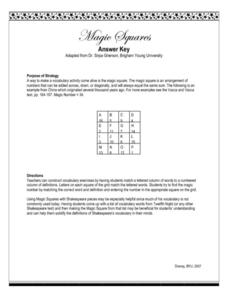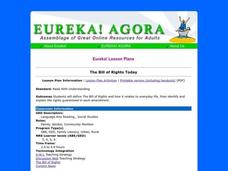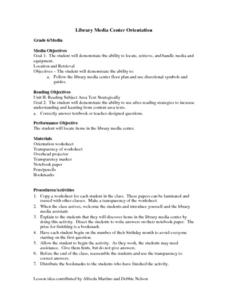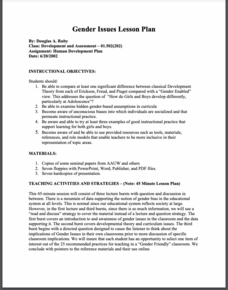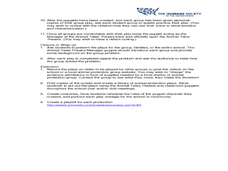Curated OER
Using Primary Sources: Letters from the Presidents
Students find out about the minds and thoughts of presidents through reading their actual letters. They explore the personal lives of presidents. They answer questions about a primary source. They write essays.
Curated OER
Tic Tac Toe Do's and Don'ts
Fourth graders listen as the counselor reads statements. They receive a tic-tac-toe worksheet and complete it with two different color crayons. Students look at the overhead projector and check their tic-tac-toe game card. They discuss...
Curated OER
Meaty Words
Headlines from newspapers launch a discussion of image-rich, meaty words. Just as headline writers choose vivid vocabulary to attract readers, young writers develop headlines that capture the essence of a passage from a book they are...
Curated OER
Simply Speaking
Emerging orators distinguish between effective and ineffective public speaking strategies. They read a text that fits in with a Native Americans unit and speak about the text with both ineffective and effective volume, tone, phrasing,...
San Francisco Symphony
Beethoven's Sixth Symphony and the Expression of Feeling through the Arts
Here is an activity used originally to finish off a unit on country life and nature. It requires learners to have a basic understanding of harvest, rural life, and autumn. They'll use what they know to construct dance movements showing...
Curated OER
Locating IIT Using Ordered Pairs
Students investigate ordered pairs. In this math activity, students plot and locate ordered pairs in a coordinate plane and are exposed to how to read and create a map.
Curated OER
Ant Writing
Students become effective writers. They need to practice strategies for working through the writing process. By presenting the students with a creative problem, they must choose a position and support it accordingly.
Curated OER
"NSN, Fractions, Percents, Ratios, Rates" Investigations
Sixth graders engage in an investigation about the concepts related to fractions. They read, represent, compare, and order proper and improper fractions, and mixed numbers. They demonstrate an understanding of relationships involving...
Curated OER
Man On the Moon!
Fourth graders are given a hand out, the instruction page for the activity. They read the answers to the following questions:"What is our goal?", "What is my timeline?, and "What resources do I have to help me accomplish the goal?" They...
Curated OER
What's Your Style?
Sixth graders complete a learning style assessment and evaluate the information gained to determine accuracy in terms of what they know about themselves as learners. They then identify and implement strategies related to their preferred...
Curated OER
Putting On Armor
Seventh graders are read the story "EMS Code Blue" and asked to share what they would do in the different situations. As a class, they discuss the importance of getting help for mental or social problems and are given a list of resources...
Curated OER
Acrostic Book Report
Students read the story Wild Horse Winter and construct acrostic poems. In this poetry lesson, students use adjectives and events in the text to develop an acrostic poem.
Curated OER
Biopoem: Bud, Not Buddy
Young poets focus on one character from a story they are reading, collect details, and use a biopoem template to analyze this character. The activity can be used with any text.
NWT Literacy Council
Readers Theatre Scripts
Engage and entertain young learners with this collection of readers theatre activities. With over 25 different scripts, a wide range of topics are covered from simple counting and rhyming exercises to adaptions of popular children's...
Curated OER
Expressive Body Part Identification
Students participate in activities with Mr. Potato Head and Inspector Gadget. During the activity, they must request the body part they want to add to the body. They must state their request in a complete sentence and point to the body...
Curated OER
Collective Nouns and Verb Agreement Practice
Break down subject and verb agreement with this exercise. This activity only deals with present tense verbs and collective nouns. Pupils learn how to make the verb of a sentence agree with the collective noun by reading sentences and,...
Curated OER
Order of Operations with Variable Expressions
Middle schoolers explore grouping symbols to mathematical equations to discover the importance of the "order of operations." Learners compare the absence of commas in connected text to the absence of grouping symbols in mathematical...
Curated OER
Twelfth Night Magic Square
Reading Twelfth Night? Words drawn from Shakespeare's comedy provide the words for a Magic Square vocabulary exercise. Directions for how to craft Magic Squares are included.
Curated OER
The Bill of Rights Today
Students examine the Bill of Rights, They read the Bill of Rights and clarify the meaning of the material using different reading strategies. In groups, students brainstorm to compare and evaluate their conclusions with those of others.
Curated OER
Library Media Center Orientation
Sixth graders demonstrate the ability to follow the library media center floor plan and use directional symbols and guides. They also use after-reading strategies to increase understanding and learning from content area texts.
Curated OER
Poet Naomi Shihab Nye
Students read and analyze poetry by Naomi Shihab Nye. They define stereotypes, view and discuss a video interview with Nye, present an oral reading of a poem, and write a persuasive letter to an author.
Curated OER
Gender Issues Lesson Plan
Students examine gender biases. In this educational issues lesson, students participate in activities that require them to analyze gender issues in the classroom and challenge to break out of the mode.
Curated OER
Animal Tales Theatre
Learners participate in a theatre production involving how to protect animals. Students create their own puppets which will be used in the production. Learners read information provided to them and highlight the important information...
Curated OER
Is the Hudson River Too Salty to Drink?
Students explore reasons for varied salinity in bodies of water. In this geographical inquiry lesson, students use a variety of visual and written information including maps, data tables, and graphs, to form a hypothesis as to why the...






